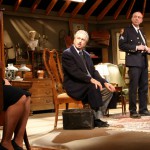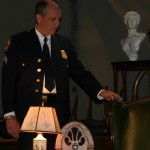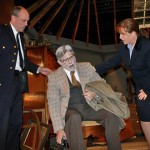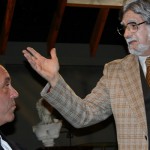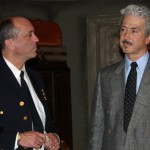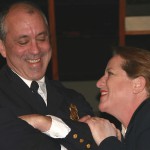GENERAL INFO
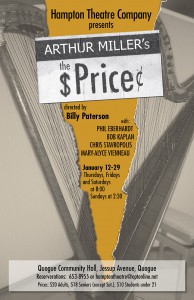
by Arthur Miller
directed by Billy Paterson
January 12 – January 29, 2006
CAST:
Victor Franz – PHL EBERHARDT
Esther Franz – MARY-ALYCE VIENNEAU
Solomon – BOB KAPLAN
Walter Franz – CHRIS STAVROPOLIS
WHO'S WHO
PHIL EBERHARDT (Victor Franz) has been working with HTC for many years (when his impossible schedule permits) and has appeared in NIGHT OF THE IGUANA, ABSURD PERSON SINGULAR, SOCIAL SECURITY, THE LAST NIGHT OF BALLYHOO, LADY WINDERMERE’S FAN, IT’S ONLY A PLAY and others. Phil holds a BFA in Acting from Boston University. This is a first for him, to reprise a great role with the same great cast and director and to have the pleasure of again sharing the stage with Mary Vienneau with whom he also shares his life.
BOB KAPLAN (Solomon) is thrilled to make his debut with the Hampton Theatre Company in this play with this cast and director. It has been a broadening artistic experience with an extraordinary group of people. He has been acting and directing at various theater companies around Suffolk for the last 20 years. He has particularly enjoyed acting in LAUGHTER ON THE 23rd FLOOR and I HATE HAMLET and directing WAIT UNTIL DARK, SYLVIA and FOREVER PLAID. He is also involved with the Teeny Awards, a program that supports high school theater by presenting awards each year to deserving students. Of course, without the support of his leading lady at home, who supports his passion for live theater, he’d be home right now with a remote in his hand.
CHRIS STAVROPOLIS (Walter Franz) was seen most recently with the Long Island Baroque Ensemble where he performed scenes from RICHARD III and TARTUFFE between the sublime music selections of the Ensemble. He also had a chance for some comic relief this summer outdoors at Mitchell Park playing Launce in TWO GENTLEMEN OF VERONA. Beyond the walls of the theater he works as a painter whose works are currently showing at galleries throughout Long Island. It is a privilege and an honor to once again be working with the actors and the director of this production. They have truly inspired me and given me the freedom to create as rich a character as I could conjure up.
MARY-ALYCE VIENNEAU (Esther Franz) has been acting most of her life. A graduate of The American Academy of Dramatic Arts, she struggled with an acting career in NY for 13 years and then decided to pursue her other love – gardening. She has been running her business – Mary’s Garden – on the East End for 15 years but has found plenty of time to continue honing her acting skills with most of the companies out here. With HTC she has appeared in THE HEIRESS, THE RAINMAKER, STEEL MAGNOLIAS, A VIEW FROM THE BRIDGE, ABSURD PERSON SINGULAR and SOCIAL SECURITY, among others. Mary is thrilled to be reprising THE PRICE here in Quogue after a successful run last year at NFTC. It’s great to be with such a talented group of actors and a special director, once again, and to be sharing the limelight with her husband and love, Phil. Thank you, HTC!
ARTHUR MILLER (Playwright) was born in Manhattan on October 17, 1915. He began his writing career at the University of Michigan where, in 1936, his first play, HONORS AT DAWN, won the Avery Hopwood Drama Award and the Theatre Guild Bureau of New Plays prize. In 1944, he won the Theatre Guild National Prize for THE MAN WHO HAD ALL THE LUCK. His first novel, Focus, appeared in 1945 and in 1947 ALL MY SONS (produced by the HTC in 2001) was produced in New York, winning Miller the New York Drama Critics’ Circle Award and the Donaldson Award. Two years later came DEATH OF A SALESMAN, also winning the Drama Critics’ Award as well as the Pulitzer Prize. In 1950 Miller adapted Ibsen’s AN ENEMY OF THE PEOPLE for production in New York, beginning his conflict with the McCarthy House Committee on un-American Activities. In 1953 THE CRUCIBLE (produced by the HTC in 1994 and later made into a feature film) appeared, winning Miller a Tony Award. In 1957 he was convicted of contempt for Congress for refusing to name suspected Communists, though the conviction was reversed by the Supreme Court. Other plays include: A VIEW FROM THE BRIDGE (1957) (produced by the HTC in 1997), AFTER THE FALL (1964), INCIDENT AT VICHY (1964), THE PRICE (1968) and, more recently, TWO WAY MIRROR (1982), DANGER: MEMORY! (1987), THE RIDE DOWN MOUNT MORGAN (1991) and THE LAST YANKEE (1993) (HTC – 1995). He has written a number of screenplays including, in 1961, “The Misfits”, starring his then wife Marilyn Monroe, Clark Gable and Montgomery Clift, as well as works of fiction and non-fiction. His autobiography Timebends appeared in 1987. He died on February 10, 2005.
BILLY PATERSON (Director). This is Billy’s first time directing for the Hampton Theatre Company. He has, over the years, stage managed, run lights, acted and helped in any way he could for the theater company that he loves. Billy has been an actor for more than 25 years and has appeared on stages in NYC, LA and most of the East End. He would like to dedicate this production to Ernie Martin, his acting teacher from 1984 through 1991.
PETER MARBURY (Set Designer) is the resident set designer for the Hampton Theatre Company. He has managed, on a small budget, to recreate myriad environments from Victorian parlors to Cape Cod beaches. When not creating sets, Peter can be found in his studio, where he busies himself making sculpture. For relaxation, he grows vegetables in his garden.
SEBASTIAN PACZYNSKI (Lighting Designer) designed SUMMER AND SMOKE, PROOF, NIGHT WATCH and PAINTING CHURCHES for the Hampton Theatre Company as well as the new theater’s lighting system. He has designed lighting for theater, dance and special events in a number of Broadway, Off Broadway, Off Off Broadway and regional venues. He has also worked in film and television as the director of photography. Local design credits include RED HERRING, THE CHERRY ORCHARD, DRACULA, JULIUS CAESAR, MACBETH, HAMLET and MOBY DICK at the John Drew Theater and THE COMEDY OF ERRORS, THE TAMING OF THE SHREW, A WINTER’S TALE and TWELFTH NIGHT for the Hamptons Shakespeare Festival.
KRISTIN SINKEL (Stage Manager) is thrilled to be stage managing for HTC once again, especially for such a wonderful cast and director. Kristin has been assistant stage manager for many recent HTC shows, including PAINTING CHURCHES, NIGHT WATCH and PROOF. She had the amazing opportunity to work this summer on MOBY DICK REHEARSED at the John Drew Theater in East Hampton where she was thrilled to work with such an amazing group of professionals, including director Tony Walton, stage manager Brian Meister, and actor Peter Boyle. Outside of the theater, Kristin works at Olde Towne Animal Hospital in Southampton, and she is “mommy” to dogs Valentine and Corky, and cats Jackie, Queenie, Ruben, and Cherie.
PRODUCTION STAFF
Director – BILLY PATERSON
Associate Director – SARAH HUNNEWELL
Set Designer – PETER MARBURY
Lighting Designer – SEBASTIAN PACZYNSKI
Stage Manager – KRISTIN SINKEL
Set Construction – RUSSELL BABIS, PHIL EBERHARDT, JAMES EWING, PETER MARBURY, SEAN MARBURY
Set Decor – DIANA MARBURY
Sound & Lighting Tech – VAN POPERING
Production Graphics –
JOE PALLISTER
Program & Publicity – SARAH HUNNEWELL
Refreshments – HAIDEE QUIJANO
REVIEWS
IT’S WORTH ‘THE PRICE’ TO SEE ARTHUR MILLER PLAY
by Steve Parks
Newsday – January 19, 2006
In a cautionary note appended to the script of his 1967 play “The Price,” Arthur Miller warned against favoring one brother over the other for the moral high ground. The Hampton Theatre Company has taken heed, presenting “The Price” with as evenhanded a sibling rivalry shootout as can be expected between a cop and a physician.
Victor and Walter Franz haven’t seen each other since their father died 16 years earlier. The home where they grew up is about to be razed. All their father’s possessions, stowed in the attic apartment to which he was relegated after losing his fortune in the 1929 stock-market crash, must be disposed of. Victor, a police sergeant contemplating retirement, has hired an appraiser to take the stuff of his childhood memories off his hands. But his wife, Esther, stuck on the second rung of her social-climbing ambition, sees the residue of the family fortune as a way to up herself a peg or two.
Victor has been calling Walter, an obscenely successful surgeon, to bring him into the loop. It is only in the exasperation of unreturned messages that Victor turns to an ancient appraiser to deal with the detritus. At 89, Gregory Solomon refuses to be rushed, and his disdain for the rat race gives him credibility with Victor, despite Victor’s impatience for a “price.”
Despite the title’s obvious double meaning – there’s a price for everything in life – “The Price” resonates with the pain of raw and exposed family wounds that made Arthur Miller perhaps the greatest playwright of the 20th century. Although it is not on a par with his searing masterpiece, “Death of a Salesman,” it remains unmistakably an Arthur Miller.
In this Billy Paterson-directed “Price,” transplanted with the same cast from the North Fork Theater Company last season, Bob Kaplan delivers a sly, scene-stealing Solomon. When his weariness exiles him to an offstage bedroom (and we grow weary of his Old World wit), the Franzes wake us up with their emotional bloodletting: Phil Eberhardt as Victor, the cop who sacrificed his education to take care of their broken father, is unrelenting in his defense of “doing the right thing.” Chris Stavropolis as Walter makes the case for living in the present, which conveniently absolves him of responsibility for his brother’s resentment. Mary-Alyce Vienneau embodies shrewish Esther’s longing for the “better things of life.”
Peter Marbury’s set, animated by Diana Marbury’s spot-on mid-20th-century decor, creates an unspoken character in the stuff of the Franz brothers’ lives. We can almost picture the old man in his easy chair, lit like a museum piece by Sebastian Paczynski.
MILLER’S VOICE SOUNDS MORE URGENT THAN EVER
by Lee Davis
Southampton Press
Last year, the North Fork Community Theatre presented a powerful production of Arthur Miller’s 1968 drama of filial rage and the price of materialism in a materialistic society, “The Price,” directed by Billy Paterson and featuring Phil Eberhardt, Mary-Alyce Vienneau, Bob Kaplan and Chris Stavropolis.
Now, tucked up and tricked out—in one of Peter Marbury’s most storytelling, sublime and complex sets, and the finely etched and elegantly effective lighting design of Sebastian Paczynski—the Hampton Theatre Company has imported the production for another audience. And rightly so, for Mr. Miller’s play is as deep as any Greek tragedy and bears repeating and reviving, even if the ending lacks tragedy’s real catharsis (unless adjustment can, in this modern world, be regarded as catharsis).
In fact, the voice of Arthur Miller should now, more than ever, be heard in the land, because in its quiet, often poetic eloquence, it strikes to the heart of a society that seems, more and more, to be losing its heart.
No matter the subject matter, there’s never a moment in a Miller play that doesn’t continually absorb and enrich audiences with its passion about subjects and incidents that we often pass by as insignificant. And, ultimately, there’s nothing insignificant in the life of his explorations through the catacombs of contemporary American life.
In “The Price,” he plunges into a maelstrom of memory, clashing values and conflicting visions. Set in one attic room of an abandoned apartment that’s choked with furniture and mementos from a past that was inhabited, before the Crash of 1929, by a millionaire and his family, it becomes, in the present of the play, a battleground.
One of the man’s sons, a New York City cop, arrives to dispose of the contents of the apartment. The furniture is easier to dispose of, he finds, than the memories of his elegant mother, his own support of his faltering father, and the desertion of responsibility by his successful brother, a wealthy physician. There’s a price to pay for everything, he and the audience slowly begin to understand, as the remainder of the play peels away, bit by bit, what seems to be and reveals what truly is.
The way is a roller coaster ride through an excavation of human passions and wounds and greed and disillusion and final intelligence, and it all makes for a transfixing evening, particularly in this production. Director Bill Paterson, who was also at the helm for the North Fork production, has maintained a pulsating forward motion and insightful pacing that makes this an involving experience.
In the NFCT incarnation, Mr. Miller’s attenuated climax was played at one elevated level of shouted intensity, which, through repetition, ultimately lost its power. In Quogue, more subtlety and depth have resulted from a rethinking by director and performers.
The members of a uniformly excellent cast have also grown by familiarity and dedication, a little like a play that has had time to discover its identity from a longer acquaintanceship with its actors.
Robert Kaplan, as the 90-year-old Solomon, the Jewish furniture merchant called in by Victor Franz, the policeman brother, to appraise and possibly buy the contents of the apartment, still portrays, with gentle humor, a three-pronged character. His overriding function is as comic relief, but he’s also the personification, for all his good humor, of the avarice of the age. And to add to this, he offers, now and then, insights that make him worthy of the name of Solomon. Mr. Kaplan balances these three qualities with rewarding agility.
Chris Stavropolis, as Walter Franz, the successful brother, again mines the man beneath the symbol with increased insight and sensitivity. A more tragic figure than he was in last year’s production of the play, his confessions form the substance of the revelations that power the heart of the play and line out its major themes.
In the mind and memory of his brother, Victor, he’s a betrayer, a villain, an enemy. And a once loved brother. But memory is hardly ever reality, and as the revision that revelation produces progresses, the tragedy of mistaken impressions deepens. Miller, like O’Neill, while speaking in contemporary voices, generates his themes with the same power and purpose as the Greeks. If only his later plays contained the same powerful catharses as those by the Greeks and Eugene O’Neill, or his own early plays.
Mary-Alyce Vienneau sustains the three-dimensional treatment that could and often does make Esther, Victor’s wife, into a one-note, apparently willing victim of a materialistic society. Mr. Miller softens this in the second act, and it’s in this act that Ms. Vienneau brings a rising sensitivity, a sweeter depth and a saving tenderness to her character and the play’s denouement. She, true to Miller’s stated theory of true tragedy, is a woman who has just missed her joy, and Ms. Vienneau makes this miss touchingly palpable.
Phil Eberhardt , as Victor Franz, the ordinary man/tragic hero, about whom too little attention is paid, mines his character even more resoundingly than he did in Mattituck. He finds other dimensions in it that are, if anything, more disturbing. Miller managed his concept of the ordinary man as a tragic hero most eloquently and completely in “Death of a Salesman” and “The Crucible,” and there are elements of both Willy Loman and John Proctor in Victor Franz.
In the two earlier plays, Loman and Proctor, whose lives lay in waste through much of these stories, manage a saving resource of dignity to survive the tragic forces that threaten to crush them. But Victor Franz’s tenacious hold on dignity is damaged by the persistent abundance of his tragic flaw, a stubborn lack of forgiveness. A few words, a few moments by Miller, and the consequent absence of a true tragic catharsis could have been reversed.
The fault, then, is the playwright’s, not the actor’s, and Mr. Eberhardt’s rethought Victor, while more defined, is now more stubborn, and thus pays a price in a slight loss of sympathy. Still, the performance is a riveting one, from its first silent moments on stage to its unrelievedly tragic conclusion. With a force and feeling expressed in subtle touches and expressions and reactions—the real life signals of self contained tempests—Mr. Eberhardt once again proves that he’s an actor who provides a richness to the life of every play he inhabits.
In sum, then, this is an outstanding production of an important and moving, if faintly flawed work.
 Hampton Theatre Company
Hampton Theatre Company
